Migrate Fusion Objects
Migrate Fusion Objects
You can use the Fusion UI and the Objects API to migrate collections and related objects, including your searchable data, configuration data, pipelines, aggregations, and other objects on which your collections depend. You can also migrate entire apps.You might need to migrate objects in the following circumstances:
For more information about using the Objects API to export and import objects, see Objects API.The remainder of this topic describes approaches in the Fusion UI.Use the parts of the Fusion UI indicated in the table to export and import apps and specific objects. Exporting creates a zip file. To import, you select a data file and possibly a variable file.The approach with Object Explorer differs. With Object Explorer, you can add objects from other apps (or that are not linked to any apps) to the currently open app.
To upgrade from one Fusion version to a 5.x version, see Fusion 5 Upgrades to migrate objects.
- When migrating data from development environments into testing and production environments
- To back up data, so you can restore it after an incident of data loss
- When the migrator script was not able to migrate an object automatically
When you export and import objects to migrate them, make sure you that any data gets to where it is going before deleting the sources.
Migration approaches
Several approaches are available for migrating Fusion objects. This table summarizes the approaches.| Export an app | Import an app | Export an object | Import an object | Add an object to an app | |
|---|---|---|---|---|---|
| Fusion UI | App configuration | Launcher (entire app) App configuration (combine apps) | - | - | Object Explorer |
| Objects API (endpoints) | GET from export endpoint | POST to import endpoint | GET from export endpoint | POST to import endpoint | - |
Export an app with the Fusion UI
How to export an app with the Fusion UI- Navigate to the launcher.
- Hover over the app you want to export and click the Configure icon:
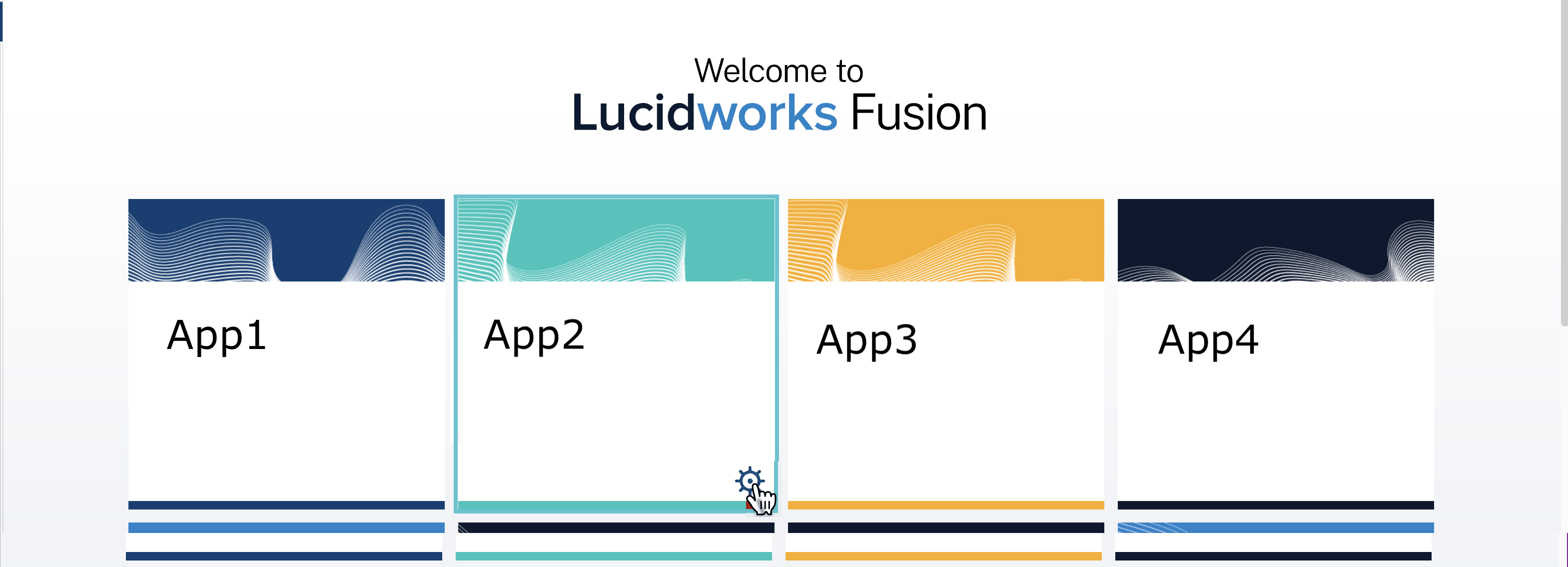
- In the app config window, click Export app to zip:
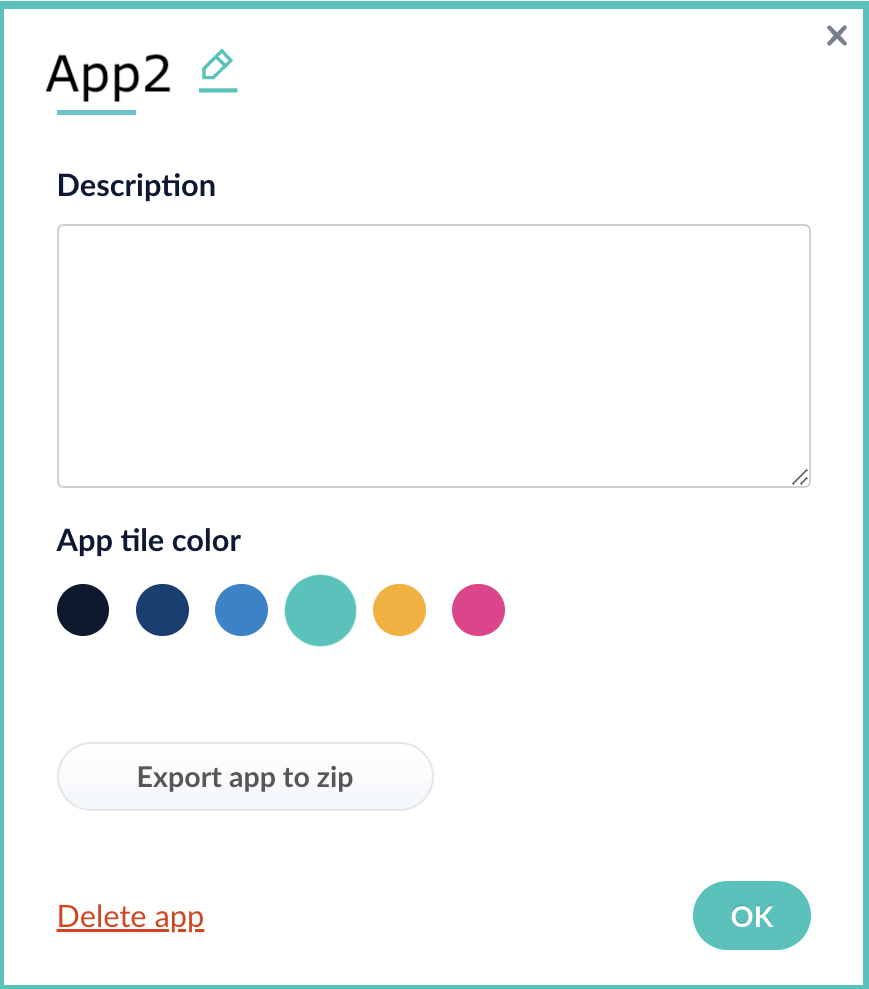
Import an app with the Fusion UI
How to import an app with the Fusion UI- Navigate to the launcher.
- Click Import app.
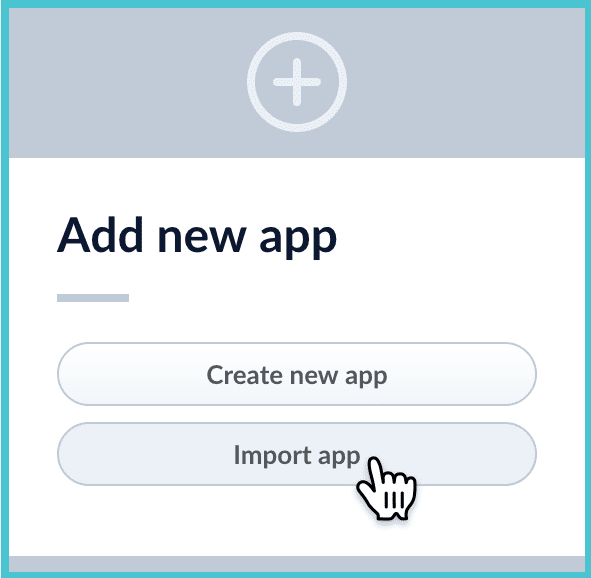
- Under Data File, click Choose File and select the zip file containing the app you want to import.
- If your app has usernames and passwords in a separate file, select it under Variables File.
If the Variables File is needed, it must be a separate file that is not in a .zip file. It is a .json map of variables to values. The following is an example:
- You can sometimes edit parameter values to use the new values in the imported app. If this is the case, Fusion displays a dialog box that lets you edit the parameter values.
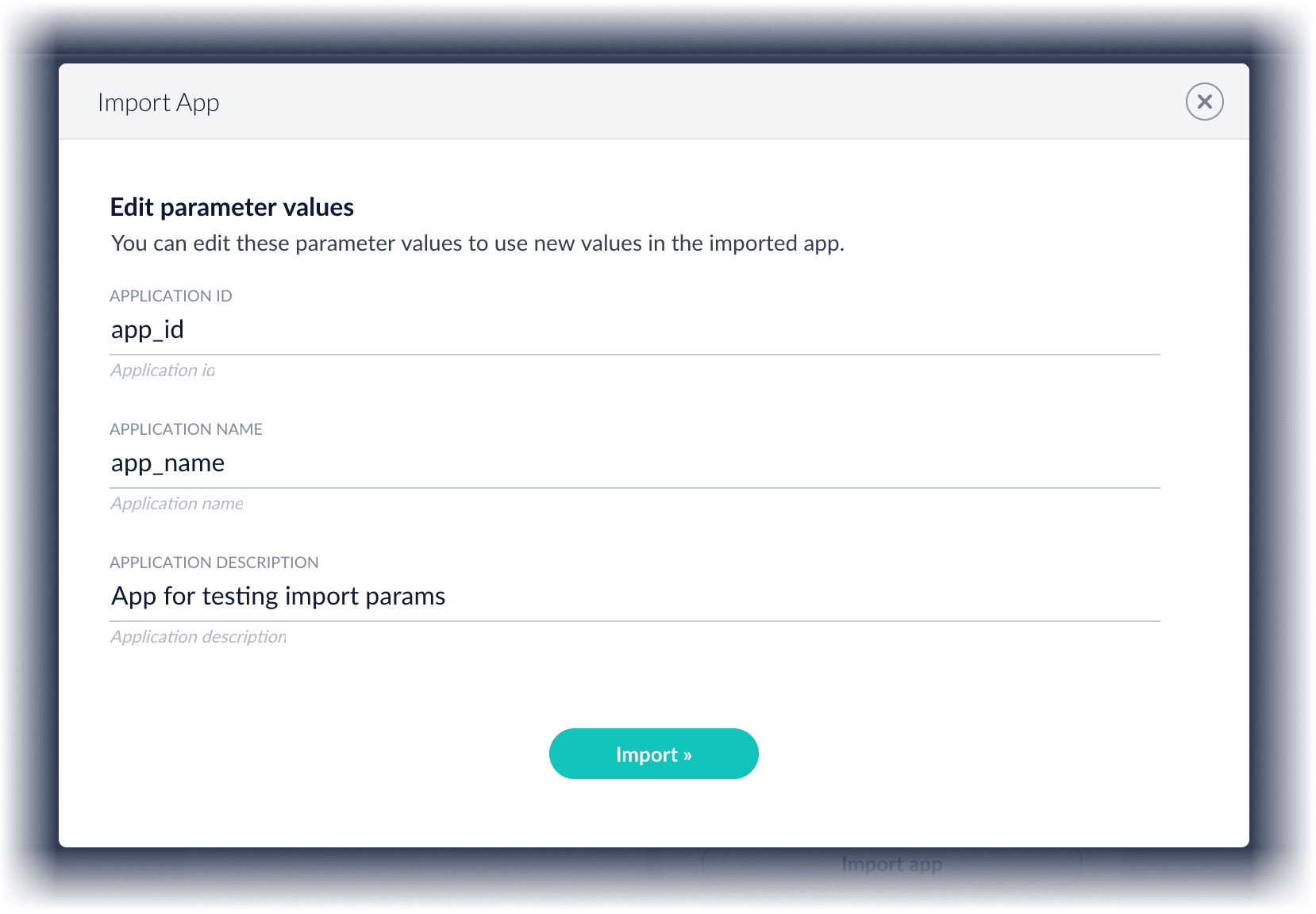
Copy an app
To copy an app from one deployment to a different one, export the app on the source deployment, and then import the app on the target deployment.Import objects into an app
You can import objects into the currently open app.How to import objects into an open app- In the Fusion launcher, click the app into which you want to import objects. The Fusion workspace appears.
- Click System > Import Fusion Objects.
The Import Fusion Objects window opens.
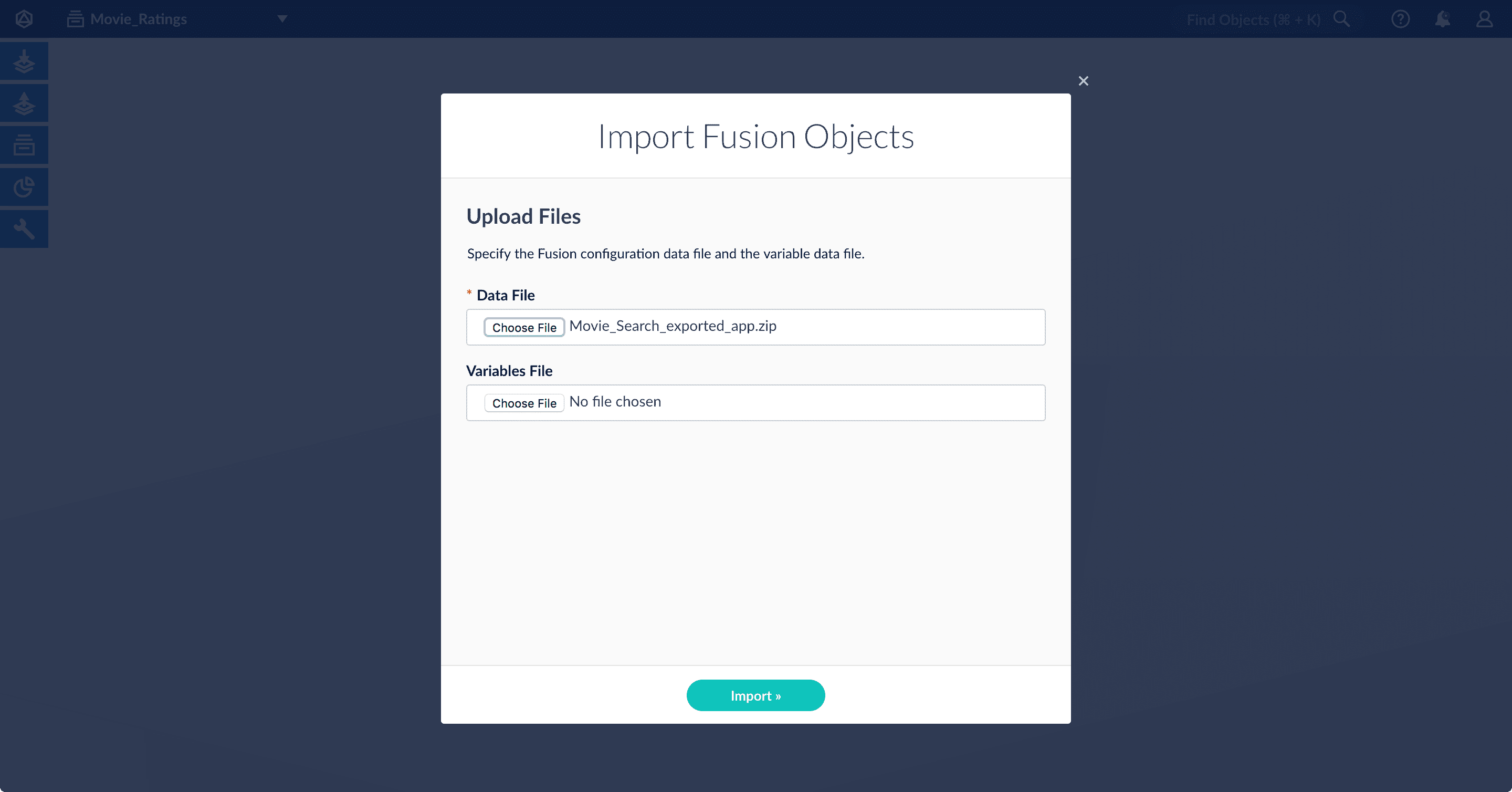
- Select the data file from your local filesystem. If you are importing usernames and passwords in a separate file, select it under Variables File.
- Click Import.
If there are conflicts, Fusion prompts you to specify an import policy:
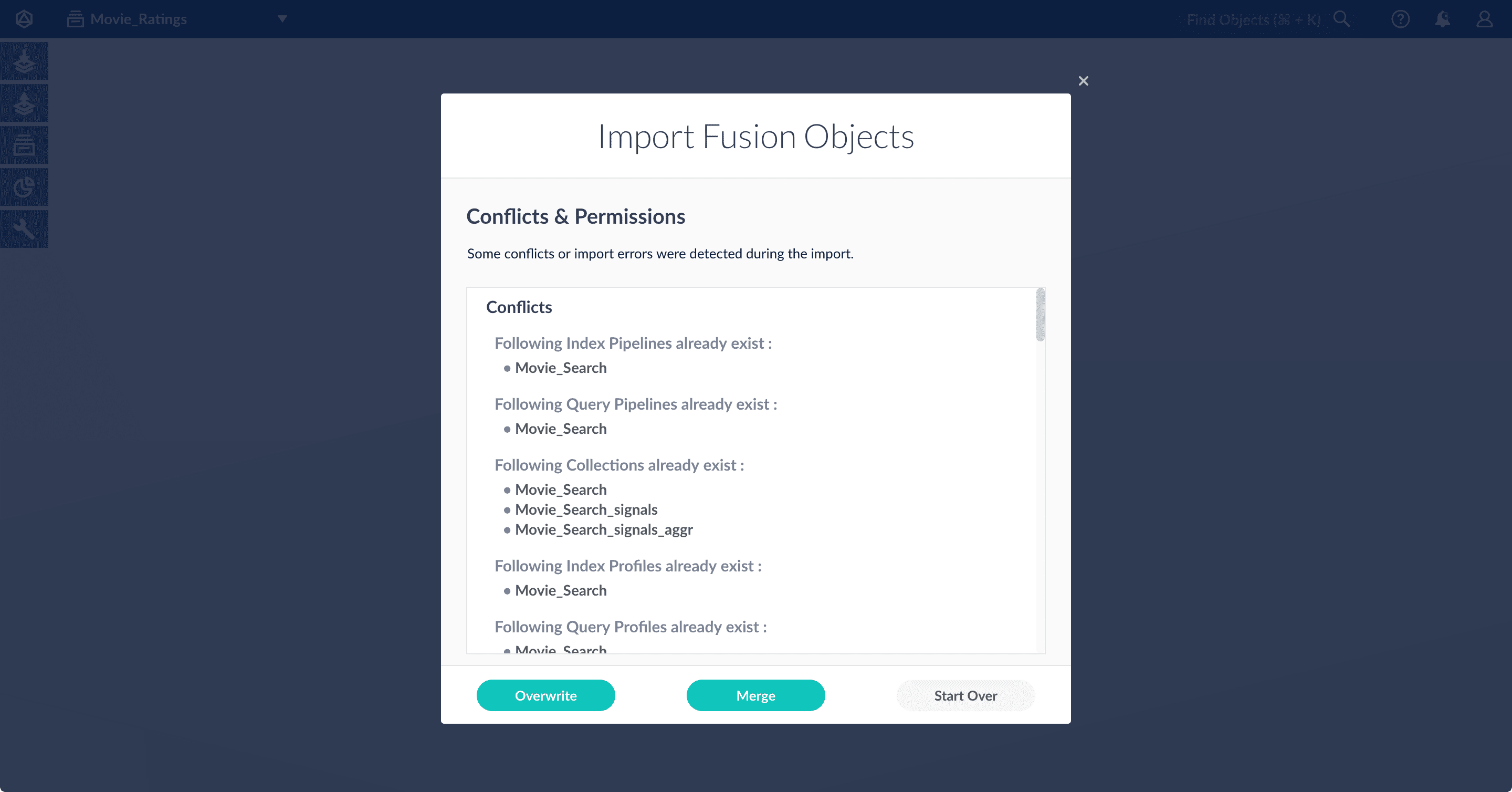
- Click Overwrite to overwrite the objects on the target system with the ones in the import file.
- Click Merge to skip all conflicting objects and import only the non-conflicting objects.
- Click Start Over to abort the import.
Fusion confirms that the import was successful:
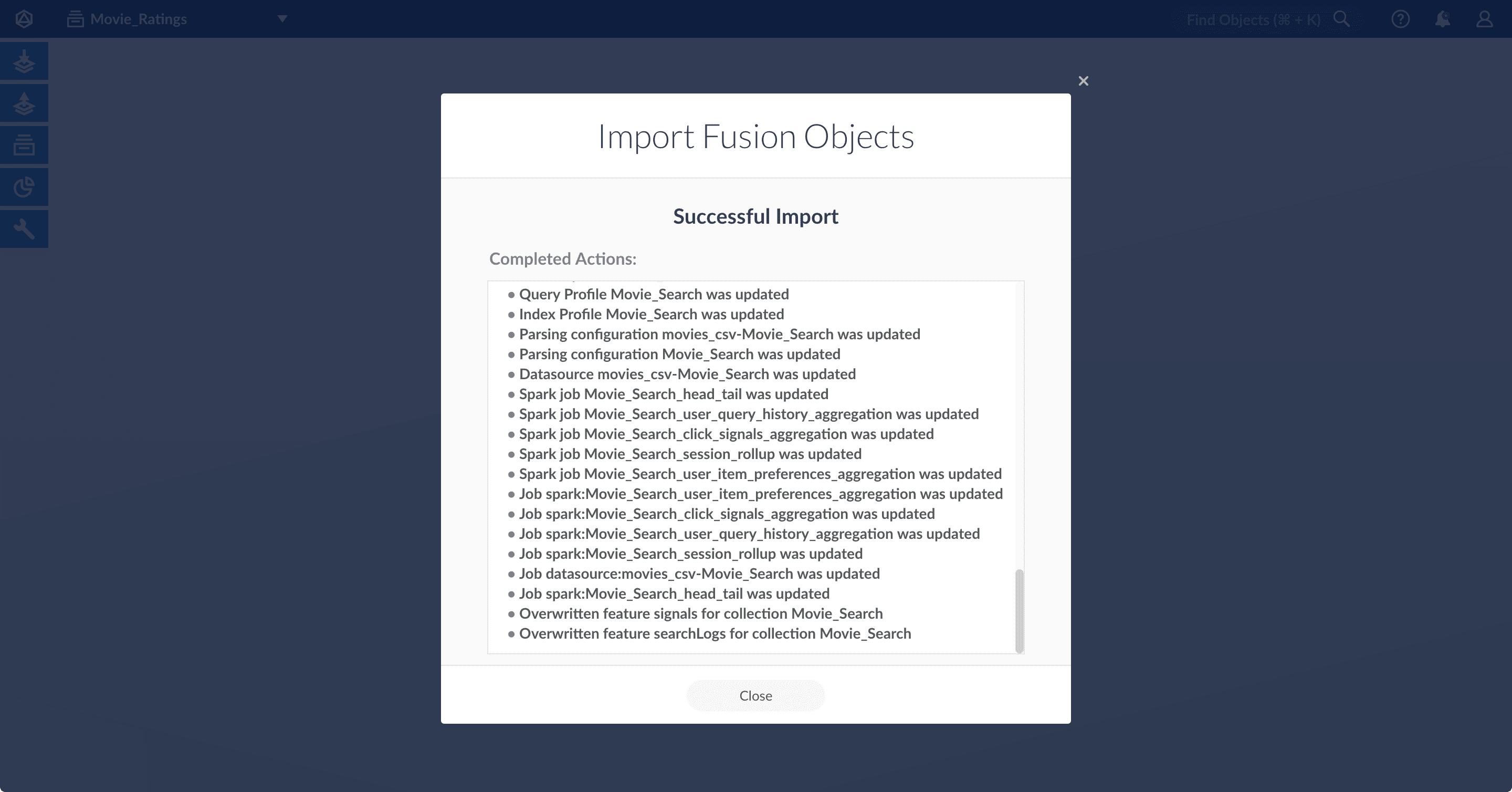
- Click Close to close the Import Fusion Objects window.
Add an object to an app
You can add objects present in other apps (or in no apps) to the open app. Some objects are linked to other apps. You can also add those directly to an app.-
Add an object to an app – While in the Fusion workspace for the app to which you want to add an object, open Object Explorer and click In Any App. Search for or browse to the object you want to add. Hover over the object, click the App
 icon, and then click Add to this app.
icon, and then click Add to this app.
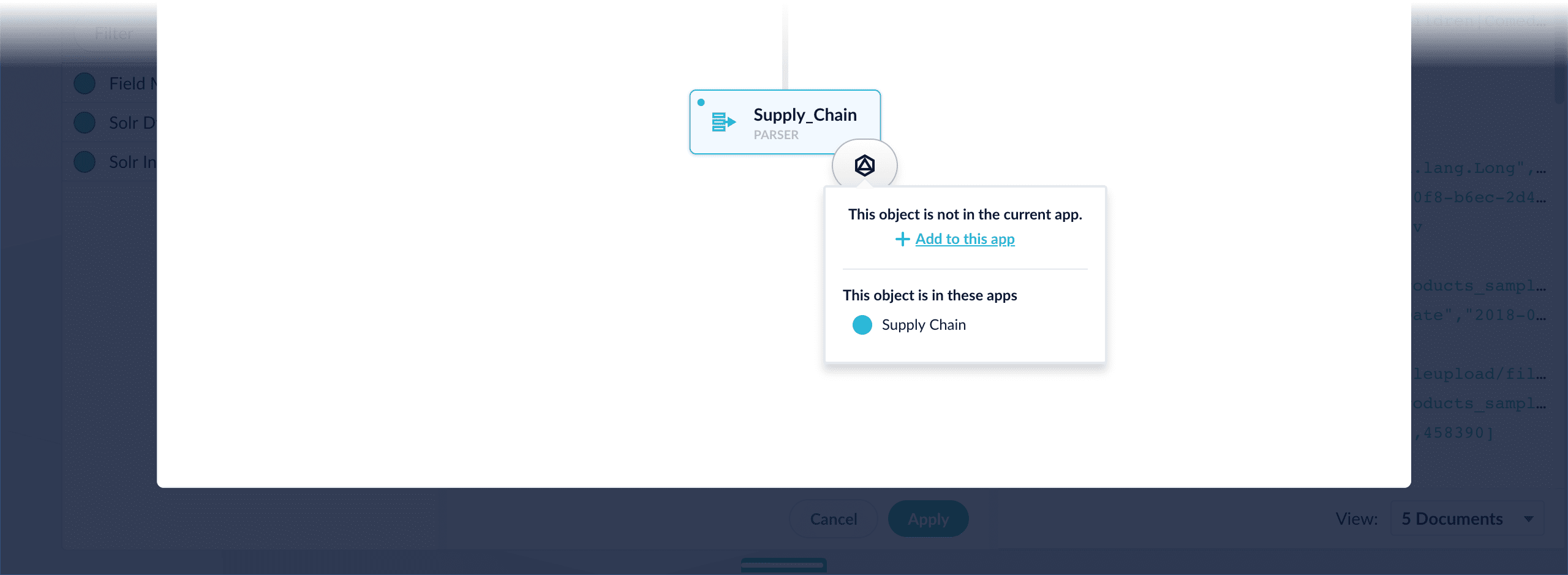
-
Add an object to an app directly – In cases when an object is linked to an app, but is not linked directly to the app (it is linked via some dependency), you can add the object to an app directly.
While in the Fusion workspace for the app to which you want to add an object directly, open Object Explorer and click In Any App. Search for or browse to the object you want to add. Hover over the object, click the App
 icon, and then click Add to this app directly.
icon, and then click Add to this app directly.
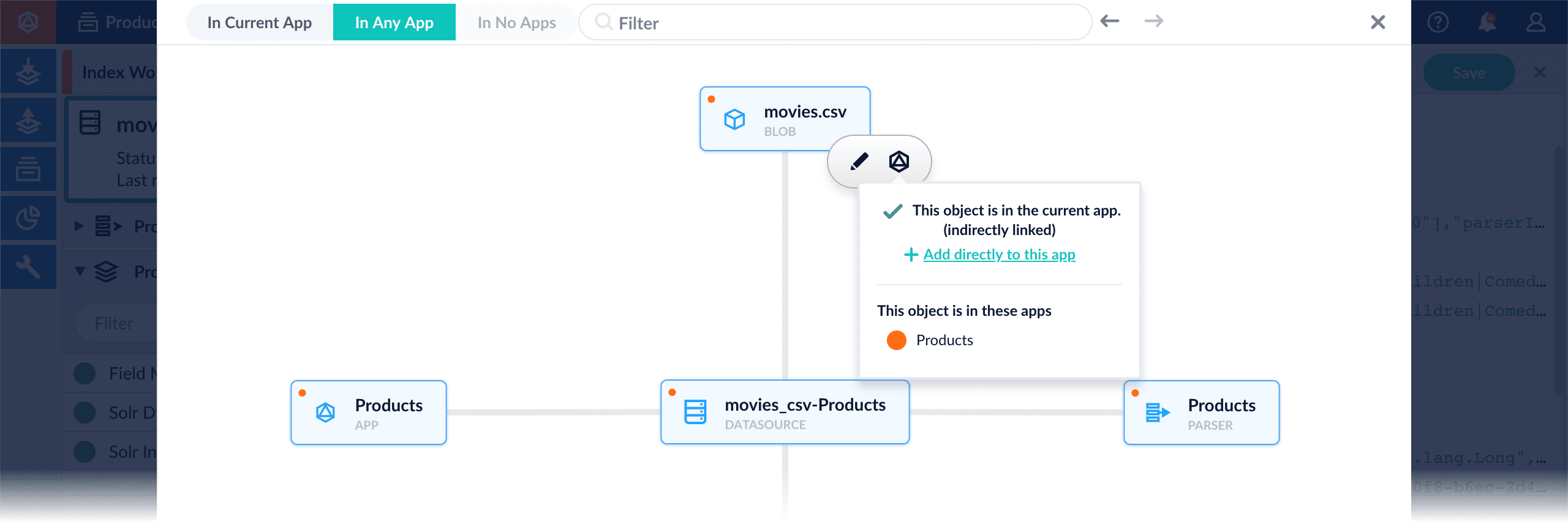
ImportantFor both the API and UI, migrating objects is intended for use within a specific Managed Fusion version. See Fusion 5 Upgrades to migrate objects from one Managed Fusion version to a specific Managed Fusion 5.x release.
Fusion 5 Upgrades
Fusion 5 Upgrades
This guide describes how to perform Fusion 5 upgrades.Lucidworks recommends upgrading to the next minor version only. For example, you should upgrade from Fusion 5.6.1 to Fusion 5.7.1 before upgrading to Fusion 5.8.0.The general upgrade process is described in this article. However, the specific upgrade procedures may vary depending on your upgrade path. For the most accurate instructions, please refer to the upgrade article specific to your upgrade.
Fusion includes upgrade scripts for natively supported deployment types. To upgrade:Except for ZooKeeper, all K8s deployments and statefulsets use a ZooKeeper instances use You can also set the Lucidworks releases minor updates to individual services frequently. Pull in those upgrades using Helm at your discretion.How to upgrade Fusion
Before upgrading, be aware of changes by checking for Deprecations and Removals between versions.
General upgrade process
Fusion natively supports deployments on supported Kubernetes platforms, including AKS, EKS, and GKE.Fusion includes an upgrade script for AKS, EKS, and GKE. This script is not generated for other Kubernetes deployments.Upgrades differ from platform to platform. See below for more information about upgrading on your platform of choice.Whenever you upgrade Fusion, you must also update your remote connectors, if you are running any. You can download the latest files at V2 Connectors Downloads.Natively supported deployment upgrades
| Deployment type | Platform |
|---|---|
| Azure Kubernetes Service (AKS) | aks |
| Amazon Elastic Kubernetes Service (EKS) | eks |
| Google Kubernetes Engine (GKE) | gke |
- Open the
<platform>_<cluster>_<release>_upgrade_fusion.shupgrade script file for editing. - Update the
CHART_VERSIONto your target Fusion version, and save your changes. - Run the
<platform>_<cluster>_<release>_upgrade_fusion.shscript. The<release>value is the same as your namespace, unless you overrode the default value using the-roption.
kubectl get pods to see the changes applied to your cluster. It may take several minutes to perform the upgrade, as new Docker images are pulled from DockerHub. To see the versions of running pods, do:Other Kubernetes deployment upgrades
To update an existing installation, do:RollingUpdate update policy:OnDelete to avoid changing critical stateful pods in the Fusion deployment. To apply changes to Zookeeper after performing the upgrade (uncommon), you need to manually delete the pods. For example:Delete one pod at a time. Verify the new pod is healthy and serving traffic, before deleting the next healthy pod.
updateStrategy under the zookeeper section in your "${MY_VALUES}" file:Upgrades with Helm v3
One of the most powerful features provided by Kubernetes and a cloud-native microservices architecture is the ability to do a rolling update on a live cluster. For example, Fusion 5 allows customers to upgrade from Fusion 5.1.0 to a later 5.x.y version on a live cluster with zero downtime or disruption of service.When Kubernetes performs a rolling update to an individual microservice, there is a mix of old and new services in the cluster. Requests from other services route to both versions.Lucidworks ensures all changes we make to our service do not break the API interface exposed to other services in the same minor release version (5.x). We also ensure that the stored configuration remains compatible in the same minor release version.
- Clone the fusion-cloud-native repo, if you haven’t already.
-
Locate the
setup_f5_<platform>.shscript that matches your Kubernetes platform. -
Run the script with the
--upgradeoption.To see what would be upgraded, pass the--dry-runoption to the script.
Helm upgrade script
Once you deploy a working cluster, use the upgrade script created by thecustomize_fusion_values.sh script. The upgrade script hard-codes the parameters and eases the need to remember which parameters to pass to the script. This is helpful when working with multiple K8s clusters. Make sure you check the script into version control alongside your custom values YAML files.Whenever you change the custom values YAML files for your cluster, you need to run the upgrade script to apply the changes. The script calls helm upgrade with the correct parameters and --values options.If you run
helm upgrade without passing the custom values YAML files, the deployment will revert to using chart defaults, which you never want to do.The script assumes your
kubeconfig is pointing to the correct cluster and you’re using Heml v3. If not, the upgrade fails. Select the correct kubeconfig before running the script.By default, system-created collections are not exported. See below for details.
Object export and import
Collections and encrypted values are treated specially; details are provided below. During import, conflicts are resolved according to the specified import policy. For objects other than collections, no implicit filtering is performed; all objects are included by default. However, on export you can filter by type and ID.Supported objects
Managed Fusion lets you export and import object types. ZIP files are the output for all file types listed. To filter by type, use the values below with thetype query string parameter; see the examples below.
| Object type | Value |
|---|---|
| apps | app The deep parameter is not needed for this object type. In the case of apps, all linked objects are included by default. |
| Appkit apps | appkit |
| blob | blob |
| collections (with their dependent objects) See below for collection-specific details. | collection |
| data-model | data-model |
| datasources | datasource |
| experiment | experiment |
| index pipelines | index-pipeline |
| index profiles | index-profile |
| job configurations | spark, type, or data-source |
| link | link |
| object group | group |
| parsing configurations | parser |
| query pipelines | query-pipeline |
| query profiles | query-profile |
| schedules for schedulable jobs (spark, type, or datasource) | job |
| search cluster configurations | search-cluster |
| subscription | subscription |
| template | template |
| zone | zone |
Exporting and importing collections
Collections are processed with these dependent objects:- features
- index profiles
- query profiles
- the “default” collection
- collections whose type is not DATA
- collections whose names start with “system_”
- “Secondary” collections, that is, collections created by features
Instead, create the same features on the target system; this automatically creates the corresponding secondary collections.
Encrypted passwords
Some objects, such as datasources and query pipelines, include encrypted passwords for accessing secure data.-
On export, these encrypted values are replaced with one of the following:
secret.dataSources.datasourceID.passwordsecret.queryPipelines.pipelineID.stages.active-directory-security-trimming.stageID.bindPassword
-
On import, the original, plaintext passwords must be provided in a separate JSON map as multipart form data:
Passwords can also be Migrate Fusion Objects.
Variables that do not start withsecret.are ignored.
Migrate Fusion Objects
Migrate Fusion Objects
You can use the Fusion UI and the Objects API to migrate collections and related objects, including your searchable data, configuration data, pipelines, aggregations, and other objects on which your collections depend. You can also migrate entire apps.You might need to migrate objects in the following circumstances:
For more information about using the Objects API to export and import objects, see Objects API.The remainder of this topic describes approaches in the Fusion UI.Use the parts of the Fusion UI indicated in the table to export and import apps and specific objects. Exporting creates a zip file. To import, you select a data file and possibly a variable file.The approach with Object Explorer differs. With Object Explorer, you can add objects from other apps (or that are not linked to any apps) to the currently open app.
To upgrade from one Fusion version to a 5.x version, see Fusion 5 Upgrades to migrate objects.
- When migrating data from development environments into testing and production environments
- To back up data, so you can restore it after an incident of data loss
- When the migrator script was not able to migrate an object automatically
When you export and import objects to migrate them, make sure you that any data gets to where it is going before deleting the sources.
Migration approaches
Several approaches are available for migrating Fusion objects. This table summarizes the approaches.| Export an app | Import an app | Export an object | Import an object | Add an object to an app | |
|---|---|---|---|---|---|
| Fusion UI | App configuration | Launcher (entire app) App configuration (combine apps) | - | - | Object Explorer |
| Objects API (endpoints) | GET from export endpoint | POST to import endpoint | GET from export endpoint | POST to import endpoint | - |
Export an app with the Fusion UI
How to export an app with the Fusion UI- Navigate to the launcher.
- Hover over the app you want to export and click the Configure icon:

- In the app config window, click Export app to zip:

Import an app with the Fusion UI
How to import an app with the Fusion UI- Navigate to the launcher.
- Click Import app.

- Under Data File, click Choose File and select the zip file containing the app you want to import.
- If your app has usernames and passwords in a separate file, select it under Variables File.
If the Variables File is needed, it must be a separate file that is not in a .zip file. It is a .json map of variables to values. The following is an example:
- You can sometimes edit parameter values to use the new values in the imported app. If this is the case, Fusion displays a dialog box that lets you edit the parameter values.

Copy an app
To copy an app from one deployment to a different one, export the app on the source deployment, and then import the app on the target deployment.Import objects into an app
You can import objects into the currently open app.How to import objects into an open app- In the Fusion launcher, click the app into which you want to import objects. The Fusion workspace appears.
- Click System > Import Fusion Objects.
The Import Fusion Objects window opens.

- Select the data file from your local filesystem. If you are importing usernames and passwords in a separate file, select it under Variables File.
- Click Import.
If there are conflicts, Fusion prompts you to specify an import policy:

- Click Overwrite to overwrite the objects on the target system with the ones in the import file.
- Click Merge to skip all conflicting objects and import only the non-conflicting objects.
- Click Start Over to abort the import.
Fusion confirms that the import was successful:

- Click Close to close the Import Fusion Objects window.
Add an object to an app
You can add objects present in other apps (or in no apps) to the open app. Some objects are linked to other apps. You can also add those directly to an app.-
Add an object to an app – While in the Fusion workspace for the app to which you want to add an object, open Object Explorer and click In Any App. Search for or browse to the object you want to add. Hover over the object, click the App
 icon, and then click Add to this app.
icon, and then click Add to this app.

-
Add an object to an app directly – In cases when an object is linked to an app, but is not linked directly to the app (it is linked via some dependency), you can add the object to an app directly.
While in the Fusion workspace for the app to which you want to add an object directly, open Object Explorer and click In Any App. Search for or browse to the object you want to add. Hover over the object, click the App
 icon, and then click Add to this app directly.
icon, and then click Add to this app directly.

Import policies
On import, theimportPolicy parameter is required. It specifies what to do if any object in the import list already exists on the target system:
abort | If there are conflicts, then import nothing. |
merge | If there are conflicts, then skip the conflicting objects. |
overwrite | If there are conflicts, then overwrite or delete/create the conflicting objects on the target system. |
Filtering on export
On export, there are two ways to specify the objects to include:- by type
To export only specific types of objects, you can specify one or more object types using thetypequery string parameter. See Supported objects for a list of valid values. - by type and ID
The
type.idsparameter lets you list the IDs to match for the specified object type.
type and type.ids parameters can be combined as needed.
Exporting linked objects
Related Managed Fusion objects are linked. You can view linked objects using the Links API or the Object Explorer. When exporting a specific Managed Fusion object, you can also export its linked objects without specifying each one individually. To export all objects linked to the specified object, include thedeep="true" query parameter in your request. See the example below.
Validation
Objects are validated before import. If any objects fail validation, the whole import request is rejected. A separate endpoint is available for validating objects without importing them. Validation includes checking whether an object already exists on the target system and whether the user is authorized to create or modify the object. For collection objects, the following special validation is performed:- We check the
searchClusterIdof each collection and verify that a cluster with this ID exists on the target system or in the import file (error). - We check that features, index profiles, and query profiles belong only to the collections specified in the import file (error).
- We check that a feature exists on the target system for each feature in the import file (error).
- We check for index profiles or query profiles that do not exist on the target system or in the import file (warning).
Status messages
Validation completed with no errors | The validation method was called and no errors found, though there may be warnings. |
Validation found errors | The validation was called and errors found. Validation does not stop on the first error, so the complete list of errors is reported. |
Validation was not completed because of system error | The validation was interrupted by system error. |
Import was not performed because validation errors exist | The import method was called, but import didn’t start because of validation errors. |
Import was not performed because of input data error | The import method was called, but import didn’t start, because Managed Fusion could not find a substitution for one of the secret values in objects in import. |
Import was not completed because of system error | The validation found no errors and import started, but it was interrupted by system error. |
Import was completed | Validation found no errors and import finished successfully. |
Examples
Export all objectsWhen you export an app that includes objects that are shared with other apps, then all apps linked to that object are also exported.
password_file.json must contain plaintext passwords.